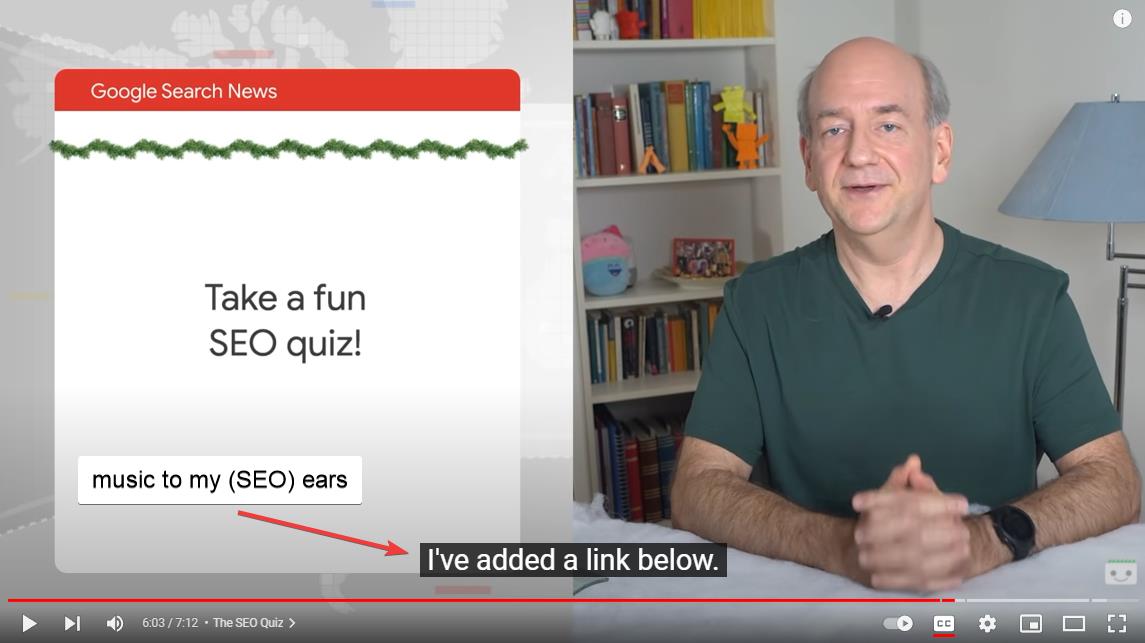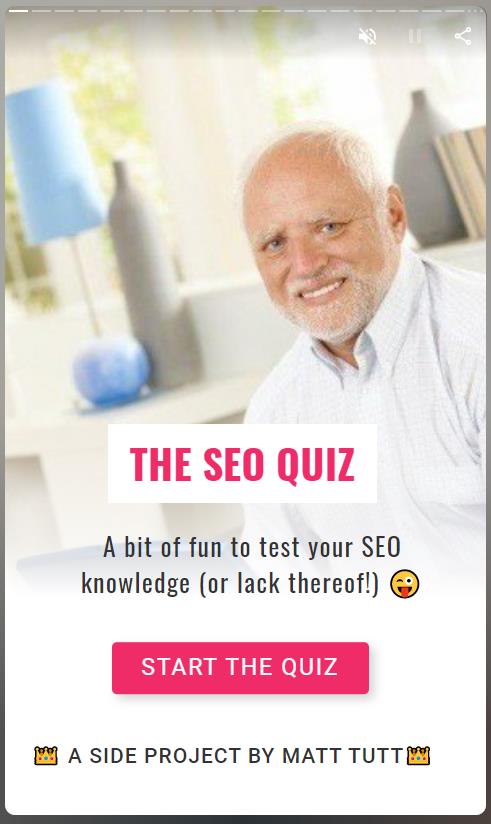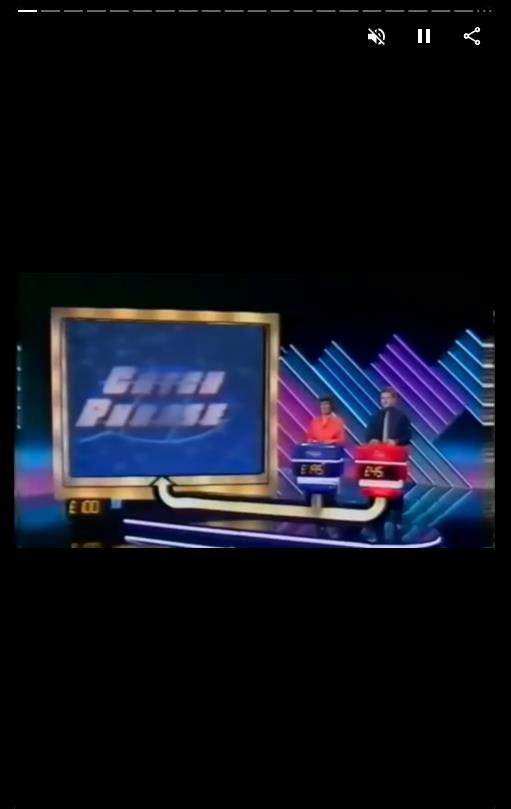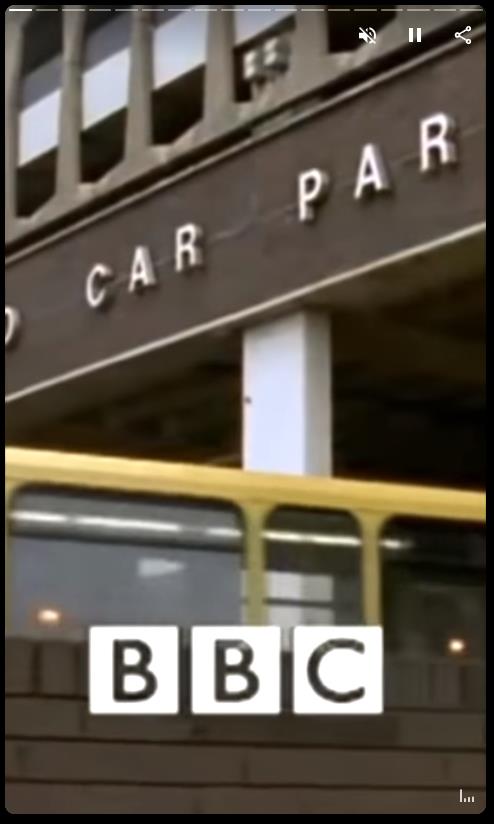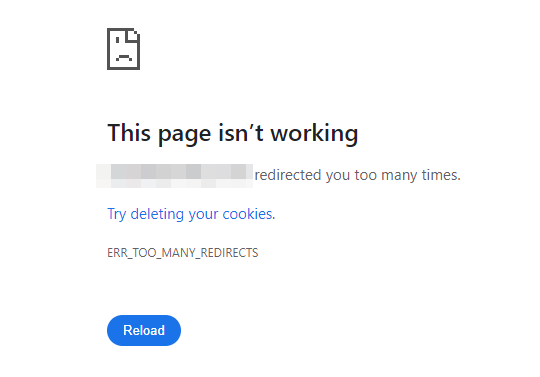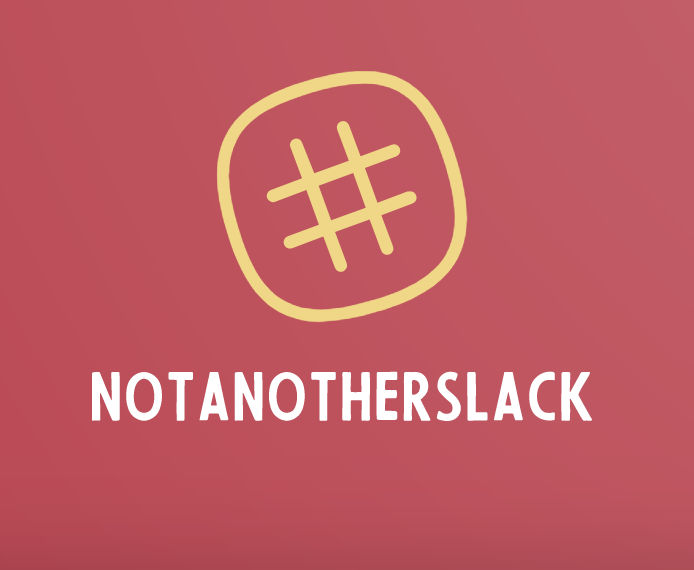First off - I know it probably sounds a bit pretentious, the whole idea of me doing a "break down" of how I created the SEO quiz, like it was some monumental occasion within SEO history.
That's not my intention, I just thought some people might like to know how EASY it was to do!
So without further ado, and like a very bad magician, this is how I went about developing and releasing the SEO Quiz.
What is the SEO Quiz?
Before I jump into the technical details, and in a bid to pad this article out a bit, the SEO Quiz was a series of quizzes I created (3 in total so far) which contained videos featuring other members of the SEO community.
Answering each question would lead you to the next, with one of the final slides showing a total score and a rating, allowing yourself to judge your SEO expertise.
Clearly it was all just a bit of fun and there wasn't much learning to be had.
My main aim of the quiz was to try and feature people who've not really had a chance to show their face before (of course only if they wanted to!), to include a diverse range of participants, and to build in that social element which might help the quiz to reach a larger audience.
I also wanted to try and humanise #twitterseo a little.
Sometimes it's easy to forget that there's a real human behind the twitter avatar you're talking or tweeting to (at least most of the time anyway) and by seeing them / hearing them speak maybe it helps a little.
I've not really met any SEO's properly in person (yet) so that's probably my own projection sneaking into the side project.
Anyway - I like to think it did fairly well on all counts.
If you haven't already you can check out the quiz for yourself at theseoquiz.com.
How was it received?
I heard nothing negative about it, only good stuff - which in my personal experience has been a nice reflection of the SEO twitter community to date.
Obviously I can't defend everything that goes on over there, but in my experience I've always felt like any questions I ask, or requests that I put out, nearly always come back positively.
I do fully appreciate not everyone has had the same experience though.
Twitter was actually crucial to the SEO quiz as it was used initially to gather participants for the quiz, and then later again used as a platform to share and amplify the quiz itself.
If I didn't have any kind of twitter presence (and to this day I'm still surprised I have any followers at all), then the quiz would never have happened.
The feedback I saw was great, and it was even featured on Garrett Sussman's iPullRank The SEO Weekly video which was a bit surreal, seeing an actual HUMAN talking about the quiz itself!
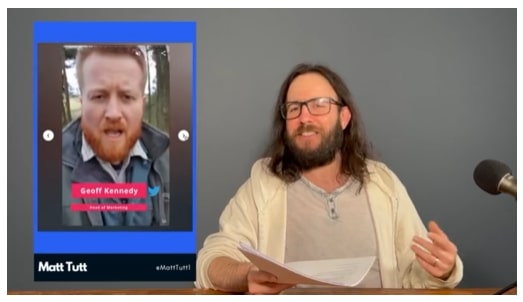
And then to top things off towards the end of the year it was included within the Google Search Central News, with John Mueller kindly giving it a brief mention at the end of the show.
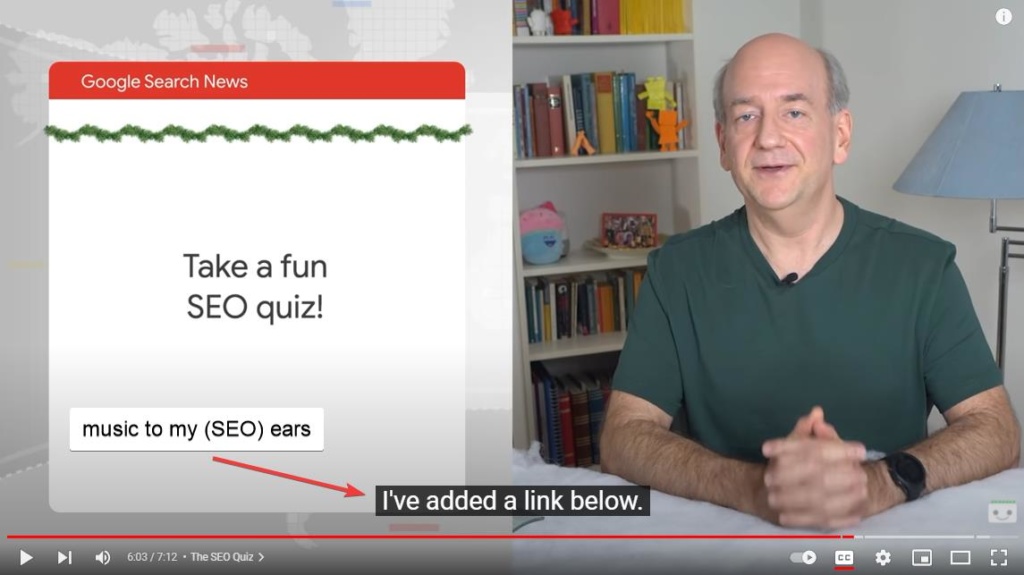
My personal take is that it was quite well received because of the nature of the AMP story format itself - allowing for full screen videos the way it does.
This makes it much more immersive (IMO) and really helps brings it all to life.
Combined with the big social element (featuring real SEO's, with their own social connections) this helped to build a bit of virality (not saying it went viral or anything as then I'd sound like a buffoon).
What about traffic?
I didn't obsess over traffic, and even the analytics configuration was a bit of a last moment thought - so in the end I was just tracking the initial website visits.
I wasn't reviewing or monitoring the traffic to the quizzes themselves.
A better marketer probably would have bothered with all that, but I was short on time / didn't really see the point.
For an earlier iteration of the SEO quiz I did want to include some genuine, serious questions, which were more to garner opinions on different matters (best tools for X, is enough being done about diversity issues, etc) so that later I could look back and have some nice data to share.
The thought was I could later say something like "out of 1000 SEO's surveyed, X% think that Y is true" and it might give me some interesting quotes to share.
Due to constraints with mixing a quiz with a poll (aka, you can't use both on the same AMP story within MakeStories) I decided to skip this.
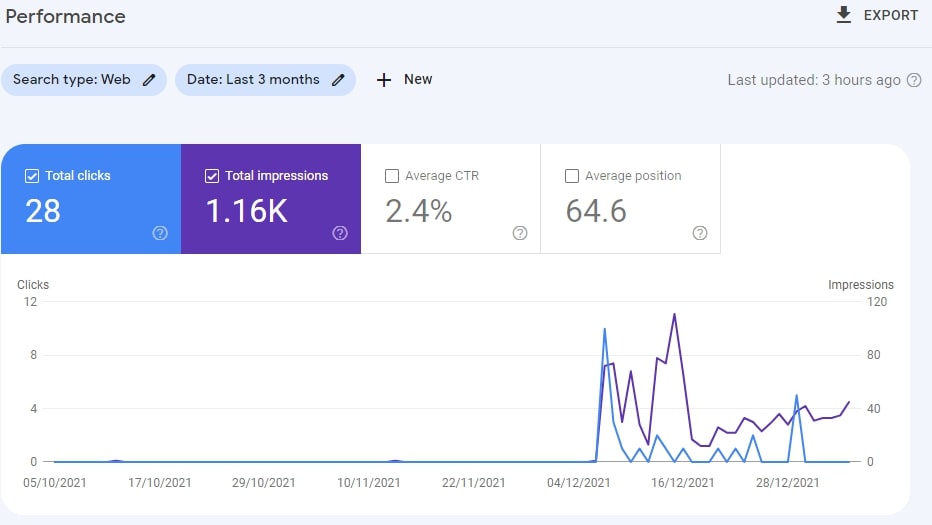
Part of me did wonder about having GA setup across the quiz to later analyse the results of the answers given - but I wasn't sure if it was possible, or even worth the hassle.
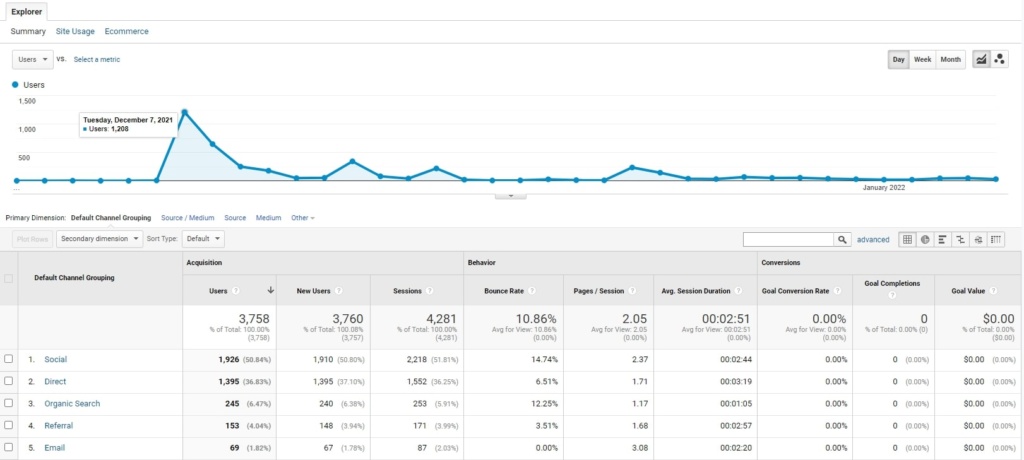
How did you make the quiz?
So down to the nitty gritty.
This is going to sound like a cop-out at this stage - but to create the quiz I used… (drumroll please)… the excellent MakeStories web interface (insert massive sound of deflation)…
Yes that's right, I didn't do any {CODING}. Because:
1) I'm not very good at it
2) It would take me ages
3) I also have real (paid) work to do.
Sadly I can't swan off and learn to do something like this properly - at least not with my terrible time management problems, combined with being just a lowly freelance SEO.
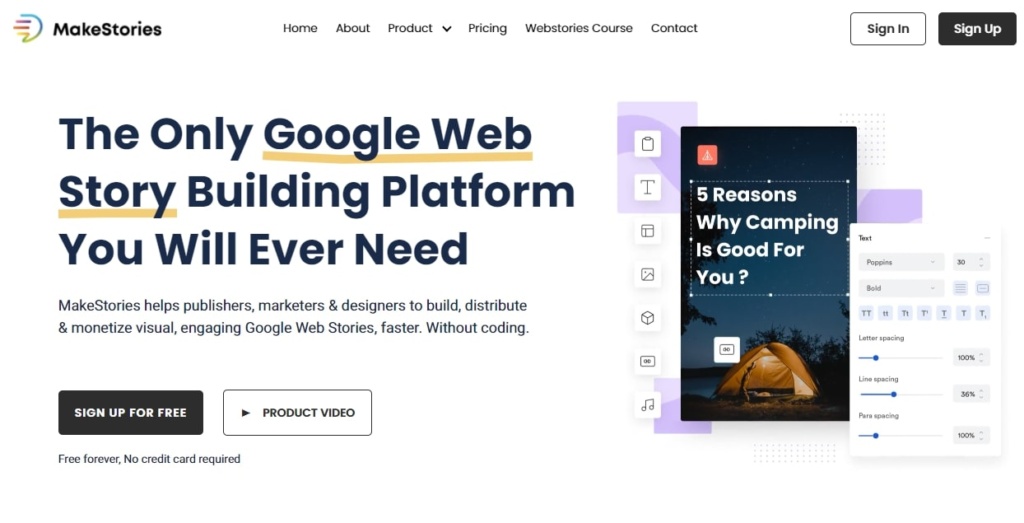
With that in mind, using the MakeStories interface was the best option for me.
Wait - what the heck is MakeStories?
MakeStories is a web interface that allows you to create interactive AMP stories.
So the SEO quiz itself consisted of an AMP story.
An AMP story is just like AMP (which stands for Accelerated Mobile Page) but on steroids.
You have more functionality included in the AMP content itself, so that includes the ability to add a quiz, a poll, video, audio, subscribe to a newsletter, and lots more.
MakeStories uses a visual interface to drag and drop elements as required, much like you'd do using a graphics editing tool like Photoshop or GIMP.
I chose MakeStories after browsing the Google AMP stories site - which was a big help in picking up bits and pieces of info.
They have a page which features other builders, and I picked MakeStories after a bit of brief research.
I liked the fact that I could use the platform for free, whilst I test/build the quiz, and only later if I add it to my domain will I incur any costs, which appeared to be around $50pm.
It turns out there actually were no costs involved, something I'm still a bit confused about.
I don't want to complain about that too loudly though, for fear they'll send me a big fat invoice.
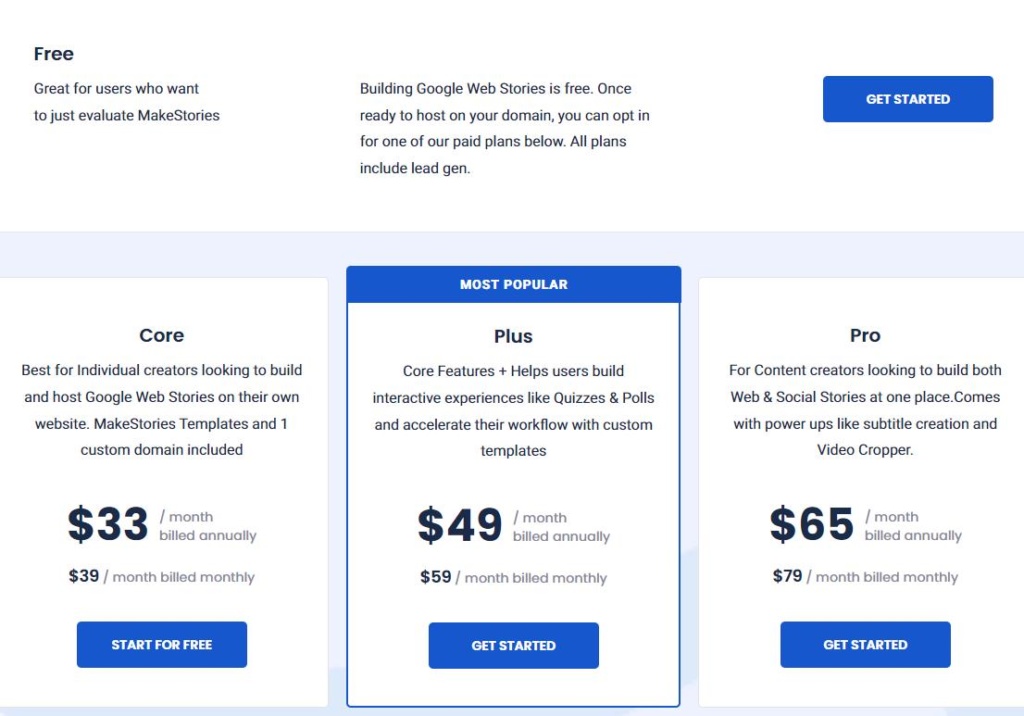
So - what did you actually do? How do you create a AMP Story?
Creating the SEO quiz was actually a test of my organisation skills and patience.
There were some tricky bits in the planning - a chicken and egg situation where I wasn't sure if I should wait for the videos to be sent to me before I go ahead and start building (and of course the big question of whether anyone will actually send me any videos).
In the end I persevered with a dummy video of myself eating a bag of cheese and onion crisps.
So - to backtrack a bit, initially my plan for the SEO quiz was completely different.
This was an idea that had been knocking around in my head for quite some time.
I wanted to finally get it out and into the wild - much like many of my own side projects.
I felt the time was right and so I was in a mad rush to complete it by the end of the year, once I'd properly announced on twitter that I was doing a project involving other SEO's.
The form of the quiz I'd hoped would be quite different - I wanted to have a more interactive element whereby if you chose answer X for a specified question, you'd be taken to page/slide Y.
That page would have a video that was applicable for your own answer - which could be a hilarious video mocking your wrong answer, or a cheery "thumbs-up" video.
After playing with the MakeStories platform and pestering their amazing support team, it was explained that what I want isn't actually possible with the format - something to do with conditional logic.
I don't think that's a problem with MakeStories itself, more an issue with the AMP stories format.
I decided this actually made my life easier and perhaps it's going to be fine anyway without that side to it.
I did toy with the idea of not using the inbuilt Quiz functionality, and instead creating graphical elements that linked to a particular page.
So, the right answer might exist at page X.html but the wrong answers would exist at Y.html.
Then I realised the linking element is a bit clunky within AMP stories.
Linking to other pages is not very seamless (I think this is more of a privacy/security thing with the AMP story format which is probably a good thing) so I settled for the inbuilt quiz format.
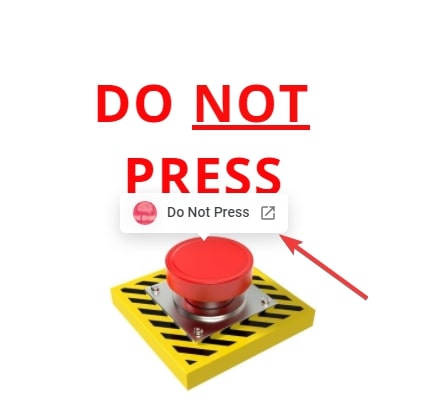
Much of my time was spent in the end doing boring tasks like:
- Writing questions and choosing answers (it's surprisingly difficult to create an above-average multiple choice SEO quiz…)
- Assigning questions to people and sending them back
- Converting any received videos to a more web friendly format (lots were received as .MOV which I'm guessing is an iPhone format, and these were often 90MB+)
- Compressing web videos to try and aim for 10MB each or less
- Finding videos on YouTube that can be trimmed down or edited as needed
- Finding and editing any suitable backing audio
The building of the quiz was the best bit - it's genuinely very easy to do within MakeStories.
The painful part was compiling all of those required components, without which you don't really have much material to work with…
Can you show us how to use MakeStories?
No.
Well not really.
The best I can do is to create a basic video recording of myself using the tool, creating a fairly simple quiz. You can check that out below.
It honestly wasn't all plain sailing.
Upon using the platform there were times when buttons stopped working, many of which would turn out were bugs with the MakeStories platform.
On some occasions I was told it wouldn't get fixed until X weeks in the future.
Luckily I could work around most of the issues, but they sure did eat in to the time it took to build the quiz.
Another limitation was the fact that once ANY answers have been received in the preview mode of the quiz, even if it hasn't yet been published, you CANNOT tweak questions or answers.
So fast forward to the moment John Mueller himself told me that TWO answers were in fact wrong after I'd published the quiz - this wasn't great news.
If you're interested in those wrong answers, I'd asked where John hailed from (I'd wrongly assumed this to be Switzerland when the real answer is Germany).
In the end I had to try and add a text element on the page itself to obscure the question, due to being unable to edit any of the live questions.
The other question that was wrong related to the number of pages in Google's index.
I'd based my answer off a Google result that was many years old, and so was now massively incorrect.
John suggested that only the likes of the Google elite would actually notice that it was in fact wrong. So I left it!
Connecting to a domain / publishing the AMP story
If I was wearing some kind of heart rate monitor, or having my blood pressure checked, it would be at this point that it began to hit it's peak - I hated this part of the process.
Initially I got lucky as I realised that MakeStories had a WordPress plugin ready to use.
This part was super simple, all I needed to do was install the plugin and then login to my existing MakeStories account within the WP interface.
I could then find the story and import it to WordPress, no issues there.
My problems were more around the publishing itself.
A few different options pop up and you have to fill in various bits of info in order to publish, such as the meta data (title, description) and then another screen where you had to set 3 different images.
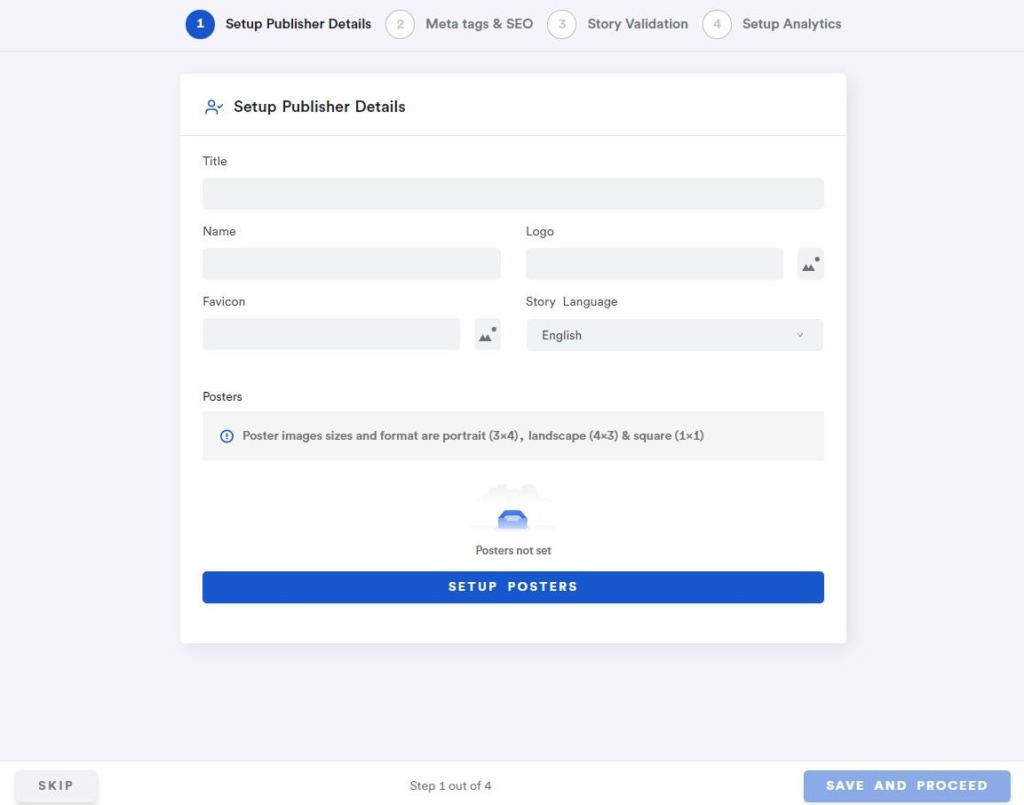
Those images were used as previews which would be shown on different device types, which I hit issues with.
Due to the sizes required by MakeStories I had to open up my image editor and start creating graphics solely to use here - a portrait, vertical and square version to represent the quiz.
I'm honestly not even sure if they did ever get shown anywhere as I don't think the quiz was featured on Google Discover or suchlike, at least to my knowledge.
(I also think the AMP story format is shown on Google Discover to users based in America, I don't think it's rolled out further (and maybe it won't ever happen?)).
And then you had to go over any warnings flagged by the tool… it all felt a bit endless.
All I wanted to do was get it out there!
Finally upon getting over those last hurdles and getting it published, you're then able to go to the AMP stories page within WordPress and find the links to the story (or quiz in my case).
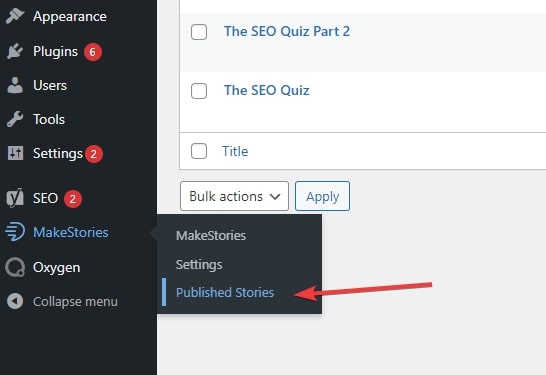
I then simply added this link to a button on my homepage.
Again, I got lucky by using WordPress on the website - and by the fact that the excellent MakeStories team had a WP plugin ready to go.
If they didn't, or if I wasn't using WordPress, I believe it would be a case of uploading all assets via FTP to a folder on my domain, and then configuring that all within the MakeStories platform.
I'm not convinced that would have been much fun to be honest.
How to SEO an AMP story? Is it even possible?
I wasn't sure about optimising the AMP story itself with SEO in mind.
All I really wanted to do was to ensure it was accessible to Googlebot and co, and I'm sure it was thanks to the internal links I'd built into the website itself.
An additional check I made was around the XML sitemap.
I use Yoast on the site and I found a new XML sitemap was added to the parent index, at the location of https://theseoquiz.com/makestories_story-sitemap.xml
At this URL I could see all the published web stories and the archive web stories page.

I think having this would help speed up the discovery of the quizzes, but I didn't really expect them to rank on Google - SEO wasn't really a big consideration here, social traction was the main aim.
At the time of writing, and solely checking for the purposes of this article, the site itself has only had approx. 30 organic visits since it's creation, and only 2 of the AMP stories have been indexed by Google.
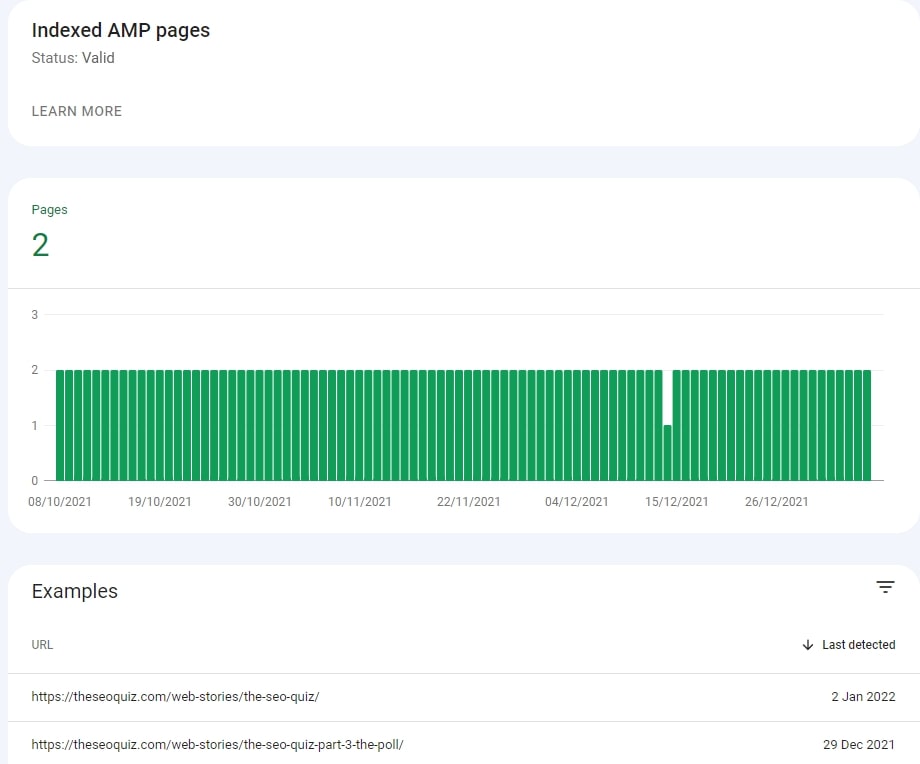
This is a bit of a surprise but I imagine it's because I've only linked to the first quiz via internal links.
Completing this quiz will take you to quiz 2, and so on, so it's likely Google isn't much of a quizzer and has been lazy about indexing the others from the XML sitemaps.
Some quizzes also have the dreaded "Discovered, currently not indexed" status in Search Console.
It's also true that in terms of content in these quizzes there isn't much happening.
There's very little crawlable text, and lots of heavy video.
Perhaps that's going to hold the quizzes back from ever entering any meaningful SERPS - not that there really are any to be targeting.
I do think it would be nice if the website was to eventually rank for "SEO quiz" with time, as there aren't a ton of great quizzes out there.
Examples of AMP Stories in the SERPS
I wanted to include a few nice examples of AMP stories ranking well in the SERPS - but in what is probably quite a good metaphor for AMP stories at present, I was yet to find any.
A while back I was sure that searching from my mobile for "things to do in NYC" or "places to visit Dublin" would have surfaced some AMP story results from Google, but right now that doesn't seem to be the case.
A lot was said about Google pulling the AMP symbol from the SERPS last year, and opening up the news carousel for non-AMP content too, resulting in many news publishers pulling the AMP versions of their content.
From my limited checks it was tricky finding good examples of AMP stories ranking well.
Doing a very niche search for my own SEO quiz I was able to find the AMP story surfacing; but this doesn't really mean much - just that they're indexable.
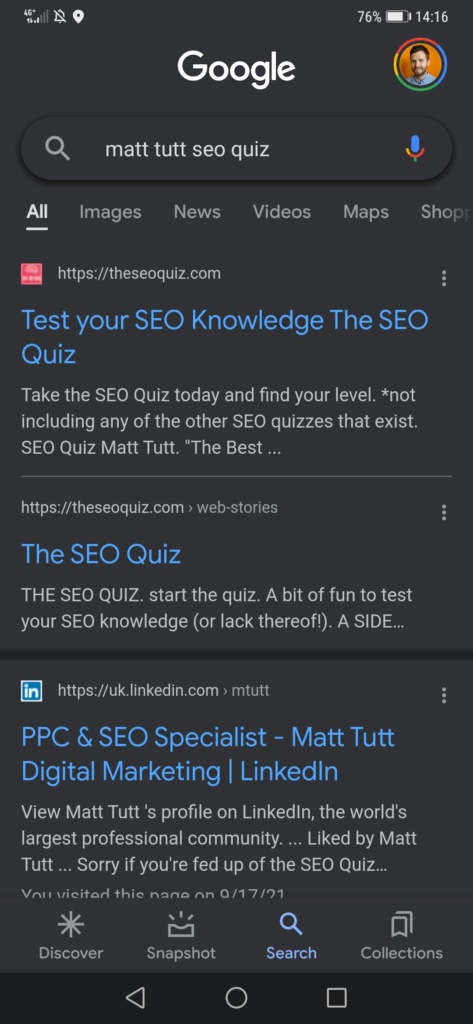
If anyone knows of any other proper examples feel free to let me know and I'll add them in here.
Quick Technical Checks on the AMP Story Format
Being curious of all things technical, I wanted to try and understand what an AMP story actually consisted of.
Whilst a traditional web page might be made up of some static HTML, a sprinkling of CSS and a light dash of JavaScript (go heavy on the JS), what about an AMP format where it consists of a series of slides, or pages.
Does it count as one almost longform page, with those slides stitched together by the Googlebot?
Or will Google only really pay much attention to what they see on slide 1 - which would be a bit of a downer, if you've got several pages with some valuable content included.
It was actually fairly tricky to test this out but this is what I could see testing the indexed AMP story (quiz version 1) from Search Console.
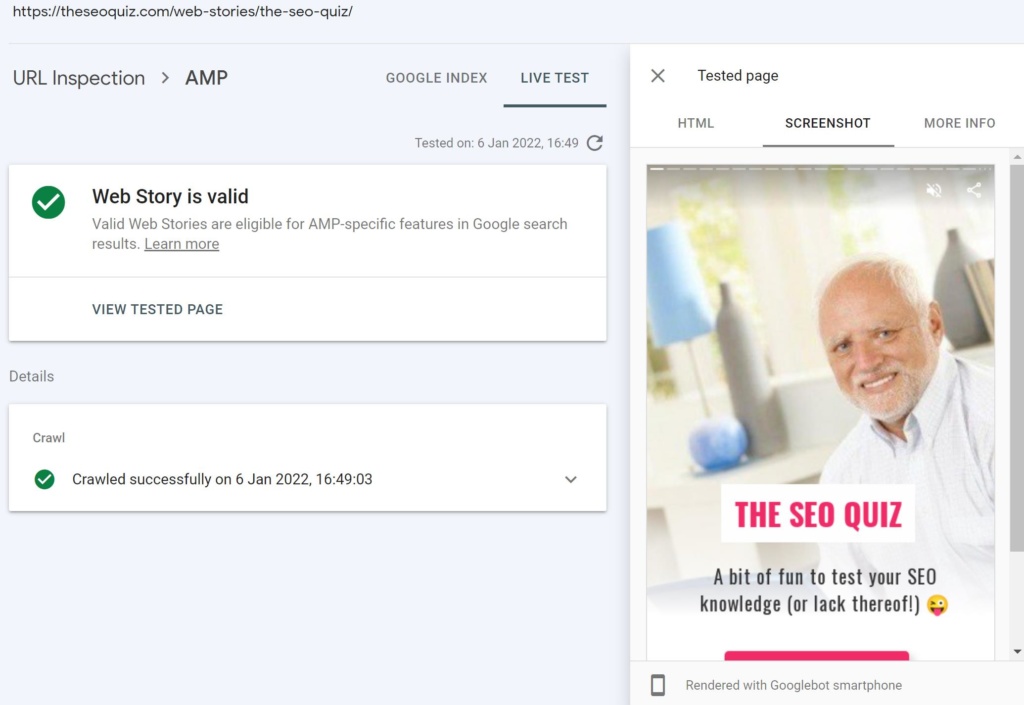
When I take the HTML here and paste into my browser, I struggled getting anything to load - I don't think that's an issue per say, but usually that's a fairly reliable way to check how a page might render in the browser.
I moved onto checking Google's cached version.
Sometimes this isn't possible - it used to be simpler to do, by hitting the little arrow next to the search result and selecting to view the cached version.
My understanding is that Google has stopped officially supporting this and have also moved it to a different menu, for when it is available.
Either way, the cached result is shown below - in which we can see all of the text that was included throughout the quiz, on a near line-by-line basis.
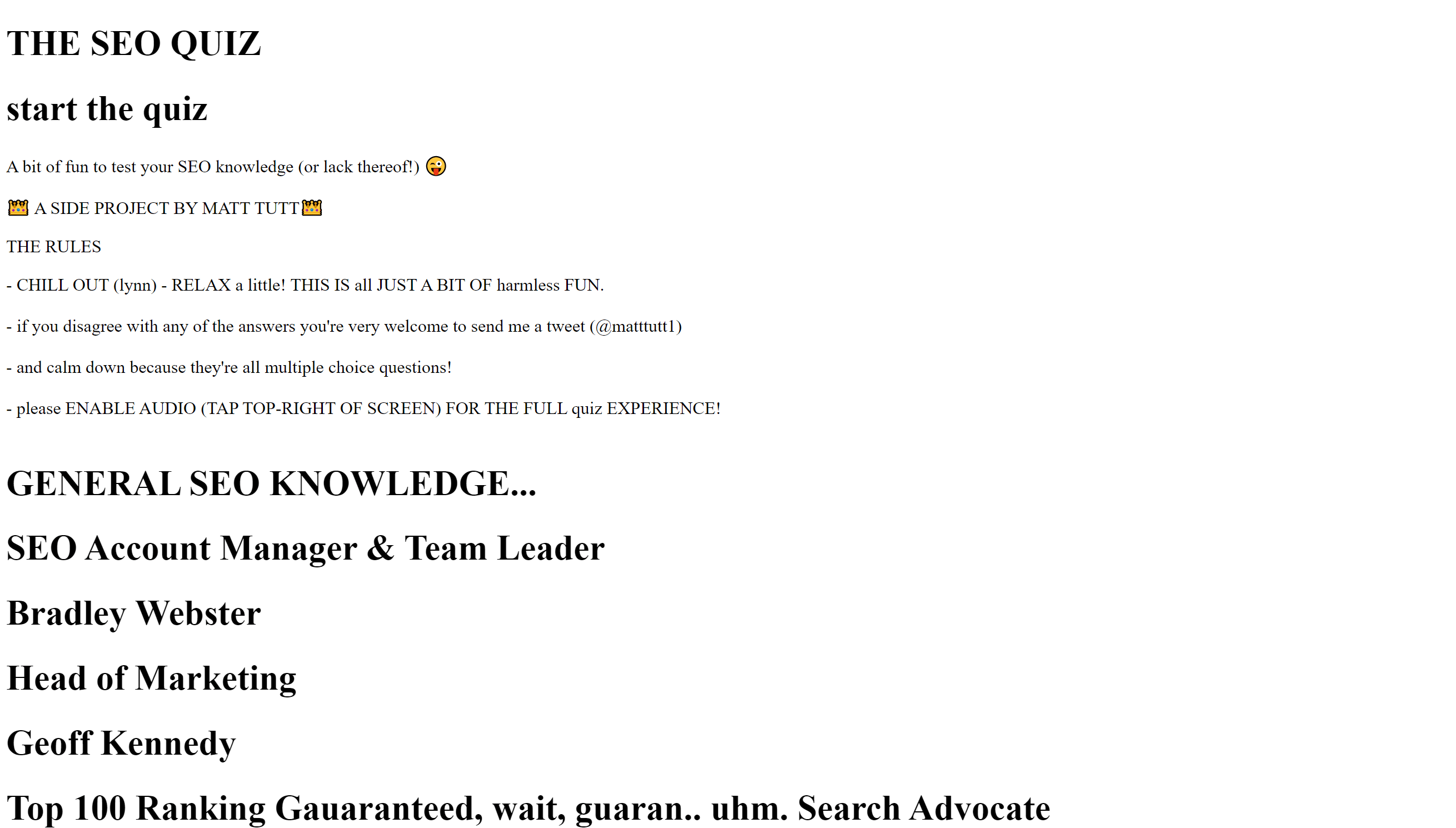
It's worth reminding ourselves here that videos aren't helping with our SEO efforts, and that the questions/answers (so the quiz element itself) seem to be invisible to Google.
If I cared about SEO I shouldn't have used the quiz functionality - perhaps this is a downside of the MakeStories builder, or any others for that matter, vs hard-coding it yourself.
I'm also painfully aware that the OpenGraph/Twitter tags don't seem to be optimised fully (bit of a bummer when social is a key target for growth!) and that the favicon which I set don't appear to be showing.
This might shock you to your core but I actually think favicon optimisation is quite a big part of the Google Discover optimisation/eligibility criteria - so that's another good thing to be aware of if you're doing your own AMP story.
Final thoughts - what do I think of the AMP Story Format?
SEO's are known to hate AMP in general - whilst I don't hate it as such, overall it kind of complicated many people's lives, and it felt wrong of Google to push it in the way they have.
On the AMP Story format specifically, I do really like it - it might appear a carbon copy of Instagram stories, but to me it gives webmasters and editors an exciting new way to present info (content?) to customers and readers.
In terms of SEO I don't think there's much to brag about with it, and I don't think it really was designed with that in mind - it's meant more for short, bite sized pieces of info, ultimately being more media focused.
The only way I think it could ever take off is if Google was to again give prominence to the format in the SERPS - something I doubt they'd be rushing to do based on feedback from the News Carousel fiasco that presented itself before.
I do however think AMP stories is a brilliant format for those bigger brands who already have a decent following and whom are looking for ways in which to involve their customers/readers in a more interactive, fun and memorable way.
That might fall outside the arena of SEO and more within the walls of social media, or even via email marketing channels.
I think of it like this - are you more likely to remember something fun like participating in the SEO quiz - or from reading your typical SEO blog post?
Hopefully it's the former! 😉
Thanks as well to everyone who volunteered and joined in with the SEO quiz itself - without which I wouldn't have been able to live my dream as the SEO quiz master!

